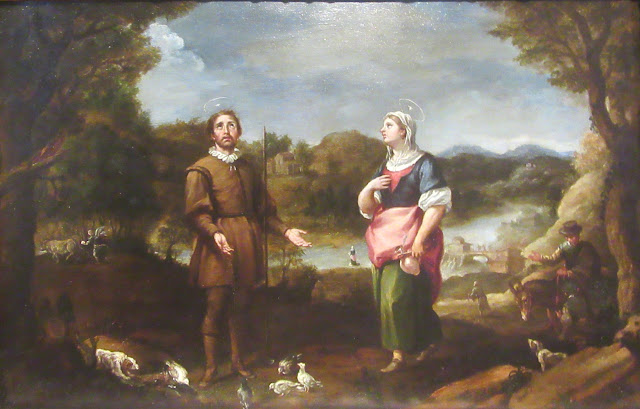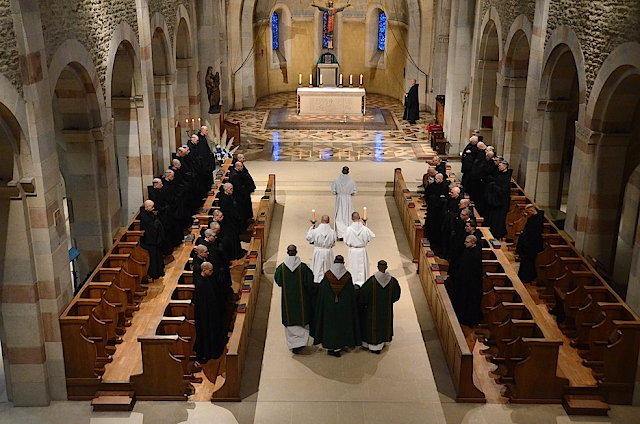Catholic devotions for the 9th September
Scroll down for today's
Saint of the DayReading of the Martyrology
Dedication of the Month
Dedication of the Day
Rosary
Five Wounds Rosary in Latin
Seven Sorrows Rosary in English
Latin Monastic Office
Reading of the Rule of Saint Benedict
Celebration of Mass
Reading from the School of Jesus Crucified
Feast of Blessed Mary de la Cabeza, believed to be the wife of Saint Isidor the Farmer
Maria's date of birth is unknown, but it was sometime near the end of the 11th century or at the beginning of the 12th century. She is believed to have been born in Caraquiz, a little village close to Uceda, in the current-day Spanish province of Guadalajara. She subsequently lived in Torrelaguna, in current-day Madrid Province. There, she met and married Isidore, a simple farmer from Madrid (who, according to some sources, had fled there as a result of the Almoravid invasion),with whom she had her only son, Illan. According to legend, the child one day fell down a deep well, leaving the parents with no recourse but prayer. Miraculously, the water level suddenly rose to the level of the ground, and the floating baby was easily rescued unharmed. As a result of this, she and her husband committed themselves to sexual abstinence as a form of devotion, and, from that time on, lived in different homes. Their son later died in infancy.
One story relates that Maria always kept a pot of stew on the fireplace in their humble rural dwelling. She knew that her husband Isidore would often bring home anyone who was hungry. One day he brought home more hungry people than usual. After she served many of them, Maria told him that there simply was no more stew in the pot. He insisted that she check the pot again, and she was able to spoon out enough stew to feed them all.
Life during the Middle Ages was not easy for women. Saint Mary of the Head was responsible for household chores and rigorous farming activities. She heavily relied on the support of her husband.
Torribia substantially outlived her husband, who died in 1130. After his death, she lived as a hermit, performed miracles, and had visions. For instance, legend suggests that every night she dreamed of the Virgin Mary, who would cross the Jarama River while extending her pure cloak over the waters.
The Reading from the Martyrology
Saturday is the Day dedicated to the Blessed Virgin and Her Immaculate Heart
Litany in Latin
The Joyful Mysteries of the Rosary are prayed on Saturday
The Rosary in Latin
Chaplet of the Five Holy Wounds of Christ in Latin
Chaplet of the Seven Sorrows of Our Lady in English
Latin Monastic Office for today from Le Barroux in France Texts also provided
6 Tertium vero monachorum taeterrimum genus est sarabaitarum, qui nulla regula approbati, experientia magistra, sicut aurum fornacis, sed in plumbi natura molliti,
7 adhuc operibus servantes saeculo fidem, mentiri Deo per tonsuram noscuntur.
8 Qui bini aut terni aut certe singuli sine pastore, non dominicis sed suis inclusi ovilibus, pro lege eis est desideriorum voluntas,
9 cum quicquid putaverint vel elegerint, hoc dicunt sanctum, et quod noluerint, hoc putant non licere.
10 Quartum vero genus est monachorum quod nominatur gyrovagum, qui tota vita sua per diversas provincias ternis aut quaternis diebus per diversorum cellas hospitantur,
10 Quartum vero genus est monachorum quod nominatur gyrovagum, qui tota vita sua per diversas provincias ternis aut quaternis diebus per diversorum cellas hospitantur,
11 semper vagi et numquam stabiles, et propriis voluntatibus et gulae illecebris servientes, et per omnia deteriores sarabaitis.
l2 De quorum omnium horum miserrima conversatione melius est silere quam loqui.
l2 De quorum omnium horum miserrima conversatione melius est silere quam loqui.
13 His ergo omissis, ad coenobitarum fortissimum genus disponendum, adiuvante Domino, veniamus.
Chapter 1 The various kinds of monks
6 The third and most detestable kind of monks are the Sarabaites, who have neither been tried by a Rule nor taught by experience like gold in the furnace (Prov 27:21); instead they are as soft as lead,
7 faithful servants of the world in their works, obviously lying to God by their tonsure.
8 Living in twos or threes, or even singly without a shepherd, they enclose themselves not in the Lord’s sheepfolds but in their own. Their law consists in their own wilful desires:
9 whatever they think fit or choose to do, that they call holy; and what they dislike, that they regard as unlawful.
10 The fourth kind are the monks called gyrovagues, whose whole lives are spent in province after province, spending three or four days in monastery after monastery as guests:
11 always wandering and never stable; slaves of self-will and the attractions of gluttony; in all things they are worse than the Sarabaites.
12 Concerning all of these and their most miserable way of life it is better to remain silent than to speak.
13 Leaving them then, let us proceed with God’s help to make provision for the Cenobites - the strong kind of monks.
Today's Celebration of the Mass



-christus-am-kreuz,-darunter-maria-und-johannes.jpg)









.jpeg)

Comments